A educação está em uma encruzilhada, moldada pela crescente influência da Inteligência Artificial. Esse fenômeno não é apenas uma tendência, mas uma transformação inevitável, especialmente no cenário do aprendizado técnico e profissional online. A IA oferece novos métodos de ensino que personalizam o aprendizado e capacitam indivíduos como nunca antes. Este artigo explora cinco aspectos-chave dessa revolução: a personalização do ensino, o impacto do aprendizado adaptativo, a evolução do ensino online, a importância das competências digitais e a visão para o futuro da educação. Cada capítulo revela uma faceta diferente de como a IA está redefinindo o que significa aprender no século XXI.
Revolutionizing Education: AI-Driven Personalized Learning
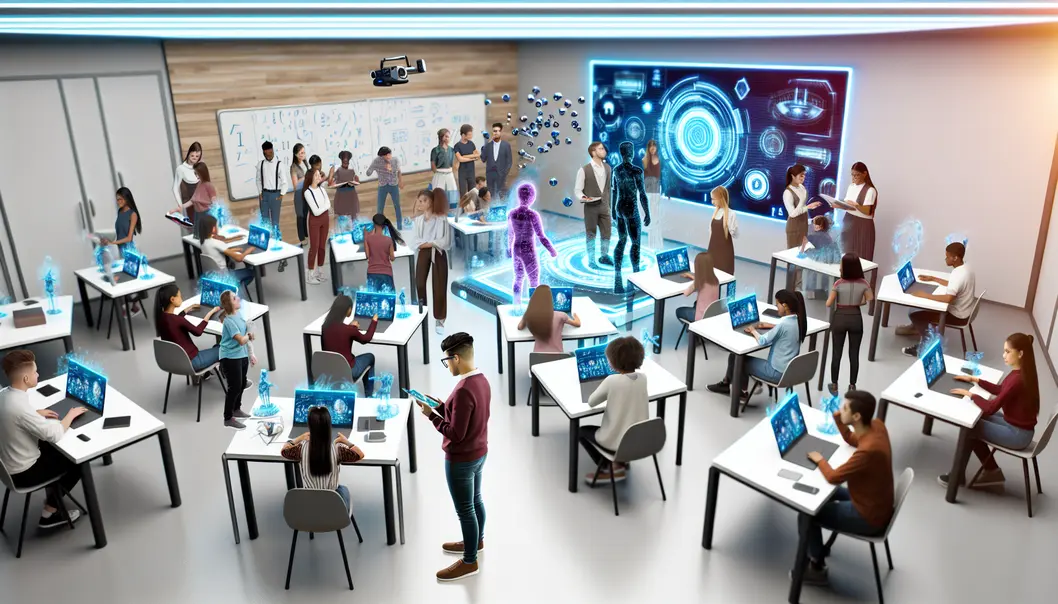
Artificial Intelligence (AI) is reshaping the educational landscape, offering unparalleled opportunities in personalizing learning experiences. Unlike traditional education models, AI-driven systems can tailor instruction to meet individual student needs, fostering a more engaging and efficient learning process. Personalization in education is not merely a trend; it is a profound shift towards understanding and leveraging the unique characteristics of each learner.
The core concept behind AI-driven personalized learning is adaptive learning, where educational content is dynamically adjusted based on real-time data. AI algorithms assess a student’s strengths and weaknesses through continuous interaction and performance analysis. By gathering insights on how a student engages with various materials, AI systems can predict optimal instructional strategies, providing resources that align with each learner’s pace and style.
One of the primary benefits of personalized learning through AI is increased engagement. When educational experiences resonate with a student’s interests and abilities, motivation naturally follows. AI creates curriculums that are not static but evolve with the learner, maintaining involvement and minimizing the risk of disengagement. Simulations, gamification, and virtual reality are among the tools AI employs to create immersive and personalized educational journeys.
Moreover, AI technologies support educators by handling routine tasks such as grading and monitoring progress, allowing teachers to focus on more complex, human-centric aspects of teaching. This shift not only makes the teaching process more efficient but also more effective, as educators can dedicate their time to fostering critical thinking and creativity, elements less easily augmented by AI. Enhanced teacher-student interactions mean more personalized feedback, addressing individual challenges swiftly and effectively.
Ethical considerations are essential when integrating AI into education. Data privacy and algorithmic bias are pivotal issues that require careful navigation. Educational institutions must prioritize transparency in how data is used, ensuring AI systems are fair and equitable. The aim is to cultivate an inclusive environment where all students benefit from personalized learning, regardless of their background.
As we explore the expanding capabilities of AI in education, it becomes clear that personalized learning is more than a technological innovation; it represents a paradigm shift towards respecting and nurturing individual learning paths. In an ever-diversifying world, visibility into each student’s needs is a critical component. As AI continues to develop, it promises to make learning more accessible and tailored than ever before.
For those interested in learning more about the intersections of technology and education, the Crafting Effective Learning Paths at Curriculum Corner offers insights into how tailored instructional strategies can be applied within diverse curriculum frameworks.
Transforming Learning with Adaptive Education Technologies
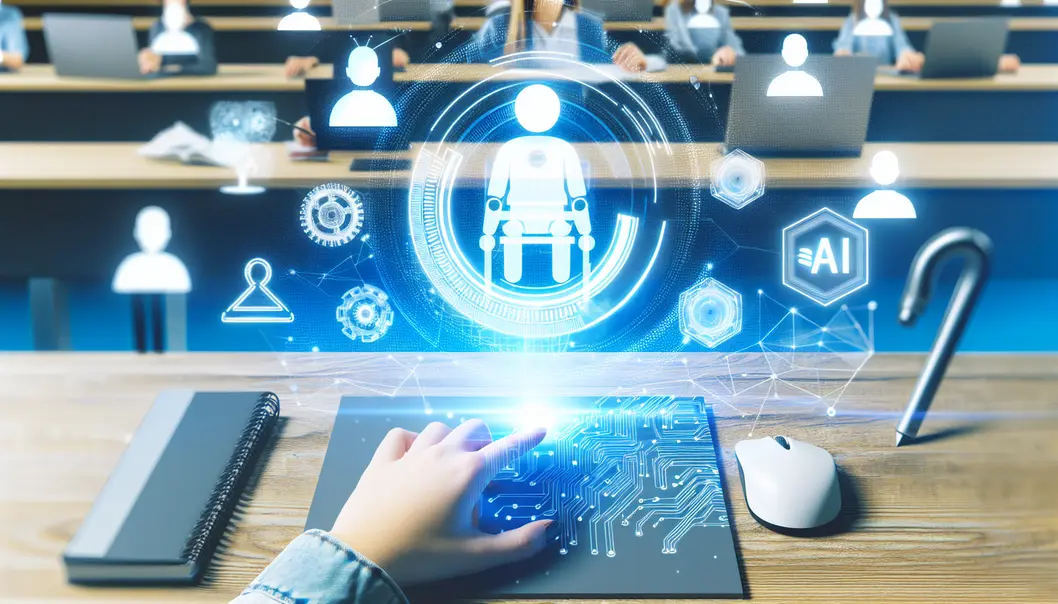
In the quest to optimize educational outcomes, adaptive learning technologies are ushering in a transformative era. These technologies are not just tools but pivotal components that actively personalize the learning journey for students across diverse environments. While traditional education models often follow a one-size-fits-all strategy, adaptive learning systems are rooted in the philosophy of shaping educational experiences to fit individual learner needs.
Adaptive learning technology harnesses data analytics and artificial intelligence to assess each student’s proficiency, learning style, and pace of understanding. This insight allows educators to tailor content, pacing, and feedback, offering a more customized educational experience. By adapting to the learner’s progress and providing real-time adjustments, these systems ensure that every student receives the appropriate level of challenge and support.
The impact of such personalized learning is profound. Students who engage with adaptive learning systems often exhibit improved retention rates and deeper understanding of complex topics. Unlike traditional methods where the learning pace is often dictated by the curriculum, adaptive systems thrive on responsiveness. For instance, if a student struggles with a particular concept, the system detects this challenge and either revisits the topic with alternative approaches or offers supplementary resources to aid understanding.
Moreover, adaptive learning supports educators by providing detailed insights into each student’s learning journey. This data-driven approach allows for informed instructional decisions without increasing the teacher’s administrative burden. In fact, instructional time is used more efficiently as educators can quickly identify and address areas where students need additional support. This balance between teaching time and data analysis leads to a more engaging and effective learning environment.
Schools and institutions adopting adaptive technologies have noticed significant improvements in student engagement and performance. The shift from traditional textbooks to interactive platforms has not only catalyzed a change in educational dynamics but also amplified student motivation. These platforms often include gamified elements, encouraging learners to participate actively and continue beyond their conventional study hours.
As [learning landscapes in academic alcove] continue to evolve with technological advancements, adaptive learning systems stand at the forefront of this evolution. Their ability to create responsive educational ecosystems manifests in classrooms worldwide, fostering a new level of educational inclusivity and excellence.
The integration of adaptive learning in educational settings marks a pivotal step towards creating an environment where every learner’s potential is fully realized. As such, the ongoing investment in these technologies and their growing presence suggest they will continue to shape the future of education in increasingly impactful ways.
The Transformative Role of AI in Online Education Evolution
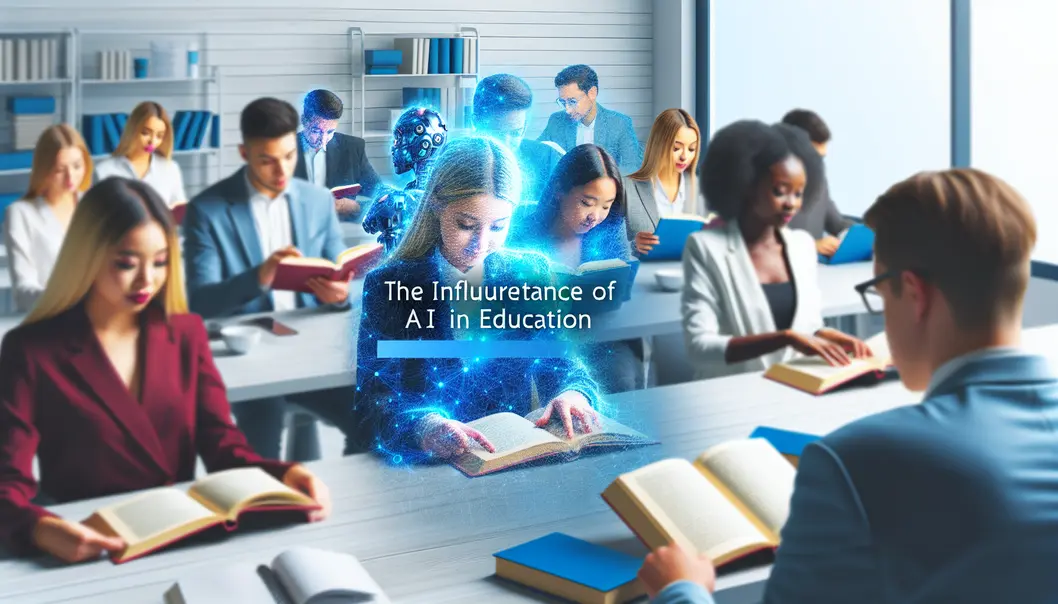
The landscape of online education has undergone a seismic shift with the integration of Artificial Intelligence (AI). As we navigate through the digital era, AI’s role in e-learning continues to expand, bringing numerous innovations that enrich and personalize the educational experience. This transformation is far from superficial; it permeates every aspect of the learning journey, setting new standards for adaptability, engagement, and accessibility.
AI’s most profound impact in education lies in its ability to create personalized learning experiences. At the heart of this customization is adaptive learning technology, which tailors educational content to meet the individual needs of each student. By analyzing data such as performance, learning habits, and preferences, AI systems can adjust the curriculum in real-time, thereby ensuring students receive the appropriate level of challenge and support. This dynamic adaptation not only boosts engagement but also enhances knowledge retention, creating a more efficient learning pathway for each student.
Moreover, AI facilitates a richer interaction between learners and educational content through intelligent tutoring systems. These systems simulate the benefits of human tutors, providing instant feedback and guidance that assist learners in understanding complex subjects. This level of interaction fosters an environment where students feel supported and encouraged to explore concepts deeply, paving the way for a more profound comprehension and mastery of subjects.
Furthermore, AI plays a critical role in accessibility, breaking down barriers for learners with disabilities. AI solutions, such as speech recognition and text-to-speech tools, ensure that online education is inclusive, providing equitable learning opportunities to all students. Such technology empowers individuals who might otherwise be marginalized, underscoring AI’s potential to democratize education.
AI also revolutionizes how educators approach teaching. With data analytics, teachers can gain valuable insights into student performance and behaviour patterns, allowing for more informed decision-making. These insights enable educators to identify at-risk students early and adjust instructional methods accordingly. As a result, AI not only enhances the learning experience for students but also supports teachers in their mission to deliver high-quality education.
Despite these benefits, the evolution of AI in online education is not without challenges. Privacy concerns and the ethical use of data remain paramount, and balancing these with technological advancements requires ongoing vigilance. Nonetheless, as AI continues to evolve, it promises to make education more adaptive and accessible than ever before.
To further explore how educational strategies are adapting to these advancements, consider reading about crafting effective learning paths and how they align with AI-driven educational models.
As we delve deeper into the integration of AI within the educational realm, it becomes clear that this technology is not only augmenting the current framework but is also forging a future where learning is a continuously evolving, deeply personalized experience. AI’s transformative influence on online education is just beginning, and its potential to redefine learning standards worldwide is immense.
Unlocking the Potential: Digital Skills in Modern Education
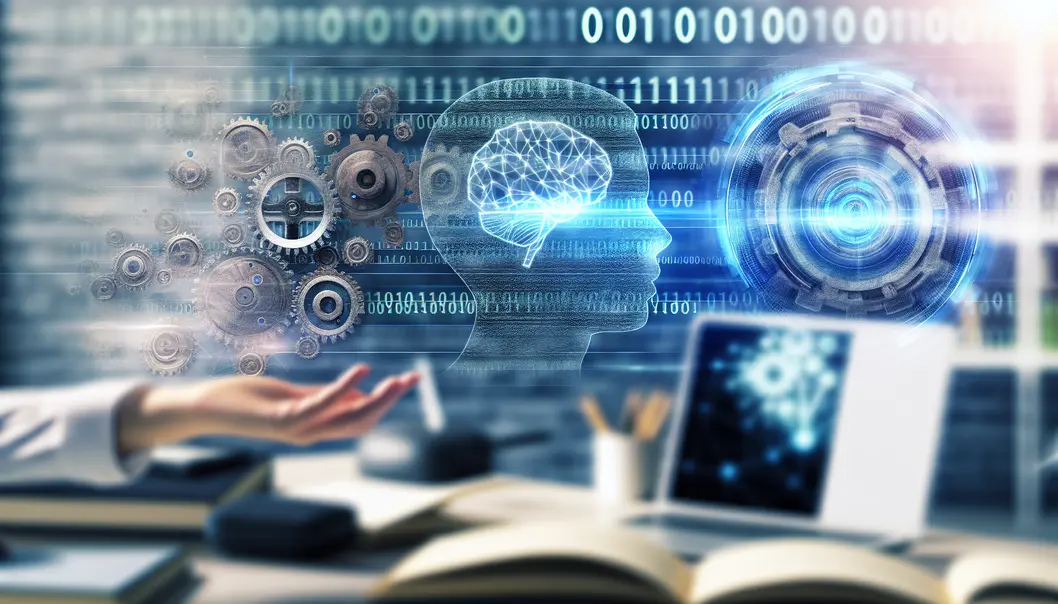
In the rapidly evolving landscape of education, digital skills have emerged as a critical component for both educators and students. The ability to navigate, utilize, and adapt to digital tools is no longer optional; it is imperative. As educational institutions integrate more technology into their curricula, the demand for robust digital competencies has soared. This chapter explores the significance of equipping learners with these essential skills and delves into how they transform educational experiences across various settings.
Digital skills encompass a wide range of competencies, including basic computer literacy, the ability to critically evaluate online information, and proficiency in using digital collaboration tools. These skills are foundational in today’s educational landscape due to the increasing reliance on digital resources for teaching, learning, and communication. As the previous chapter on the evolution of online learning with AI demonstrated, the integration of technology into education is an ongoing process, requiring students and teachers alike to keep pace with advancements to maintain efficacy in their roles.
Crucially, digital skills foster more than just technical know-how. They promote critical thinking and problem-solving abilities, encouraging students to engage with the material actively. For educators, possessing strong digital skills enables the creation of engaging and dynamic learning environments. By utilizing interactive tools and platforms, teachers can enhance traditional teaching methods and address various learning styles, ultimately improving student outcomes.
Moreover, digital literacy is paramount as education systems prepare students for a workforce increasingly dominated by technology. The skills acquired through effective digital education programs are directly applied in most professional sectors. Thus, integrating digital skills training into the core education curriculum can significantly boost students’ future employability, providing them with the tools to adapt to swift changes in workplace technologies and environments.
The move towards technology-enhanced learning also fosters greater inclusivity. Digital platforms can offer personalized learning experiences tailored to individual student needs, breaking down barriers that traditional education systems often face. As educational leaders look to the future, initiatives that expand access to digital learning tools can help bridge the gap between different socio-economic groups, ensuring a more equitable education landscape.
Internal challenges do pose obstacles to the seamless integration of digital skills within education. Schools often grapple with insufficient infrastructure, lack of teacher training, and resistance to change. Addressing these challenges requires cross-sector collaboration, investment in digital infrastructure, and a commitment to continuous professional development for educators. [https://cursos.app/crafting-effective-learning-paths-at-curriculum-corner-2/](Integrating thoughtful and effective pathways) into learning systems can equip both teachers and students with the necessary tools to flourish in a digital age.
In conclusion, the prominence of digital skills in education cannot be overstated. As we stand on the brink of an education revolution driven by technology, embracing digital literacy is essential. It ensures educational systems remain relevant and prepared for future challenges, enabling students to thrive in a rapidly digitalizing world. The evolution towards technology-centric education is not merely about learning to use digital tools; it’s about empowering the next generation with the skills they need to succeed in an interconnected, digital society.
Innovative Horizons: Envisioning the Future of Education
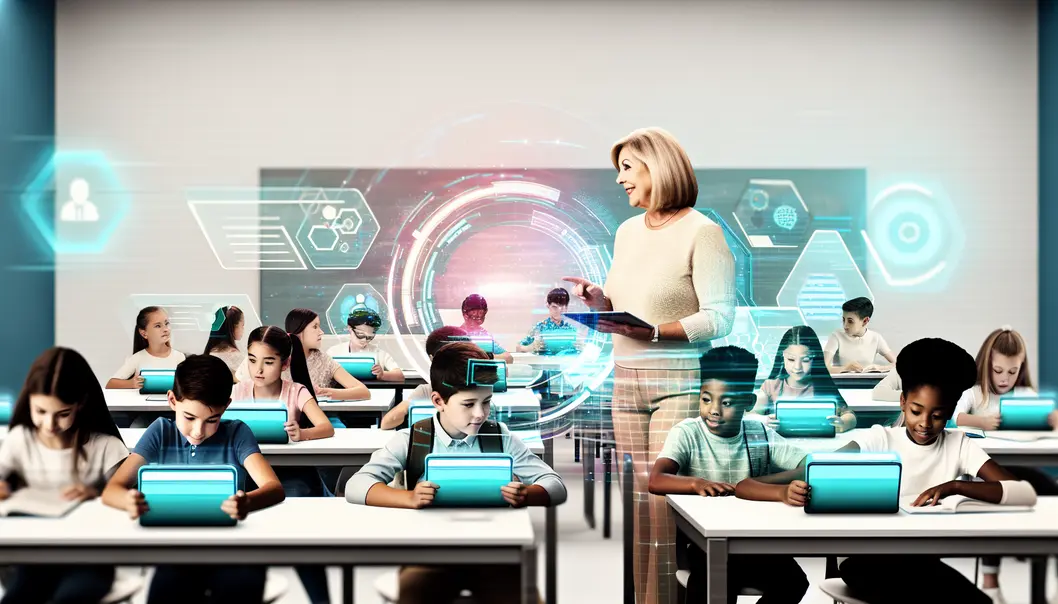
As we gaze into the future of education, it becomes evident that we are on the brink of a transformative era. This vision is not just about integrating new technologies into classrooms but reimagining how education is delivered, perceived, and experienced worldwide. The advent of digital tools has already started reshaping the educational landscape, yet the potential of these technologies remains vastly untapped.
The classroom of the future is likely to be less of a physical space and more of a dynamic ecosystem of learning experiences. With the ongoing development of virtual and augmented reality, students can expect immersive education that transcends the traditional boundaries of textbooks and lectures. Imagine participating in a virtual archaeological dig alongside classmates from across the globe or walking through a 3D model of the solar system, all facilitated by technology.
Moreover, the paradigm shift towards personalized learning paths promises to tailor education to individual needs like never before. Artificial intelligence stands at the forefront of constructing adaptive learning environments that respond to students’ strengths and weaknesses in real-time. By analyzing data, these intelligent systems can offer bespoke challenges to accelerate learning or provide additional resources when needed. This method not only fosters deeper understanding but also builds confidence in learners as they progress at their own pace.
Additionally, the role of educators is evolving from traditional information gatekeepers to facilitators of collaborative experiences. Teachers will act as mentors and guides, supporting students in navigating their unique educational journeys. This transformation requires educators to develop new skills and embrace ongoing professional growth. Those who adapt will find themselves equipped to engage students in more meaningful ways and foster environments where critical thinking and creativity thrive.
Collaboration across borders and cultures will become increasingly common, thanks to digital platforms that connect students and educators from varied backgrounds. This global interaction enriches the learning experience, preparing students for the interconnected world they will enter. By fostering an appreciation for diversity and encouraging cross-cultural exchanges, education can produce well-rounded individuals equipped to tackle global challenges.
At the heart of these changes lies the question of accessibility. As we innovate, it is crucial to ensure equitable access to these advanced educational tools and resources. Bridging the digital divide is a fundamental challenge, as it ensures that every learner, regardless of their socioeconomic status, benefits from these advancements. Collaborative efforts from governments, institutions, and the tech industry are essential to provide the infrastructure and support necessary for universal access. Crafting effective learning paths that are both scalable and inclusive will be key to addressing this challenge.
As we forge ahead, the future of education promises to be one of innovation, transformation, and possibility. By leveraging technology to craft more inclusive and engaging learning experiences, we can empower students like never before, preparing them with the skills they need to excel in an ever-changing world.
Final thoughts
A influência da IA na educação não é apenas uma mudança tecnológica, mas uma redefinição completa do aprendizado e desenvolvimento profissional. Com a capacidade de personalização, adaptação às necessidades do aluno e avanços nas competências digitais, a IA estabelece novas diretrizes para a educação online. Olhando para o futuro, é certo que a educação continuará a evoluir com a IA, tornando o aprendizado mais acessível, eficaz e alinhado às demandas do mercado. Este é o momento ideal para abraçar essas oportunidades e garantir um lugar na vanguarda do conhecimento.
Escreva Para Gente! Adoramos Receber Sugestões e Feedbacks: A participação de alunos, criadores e empresas parceiras são fundamentais para consolidação de um ecossistema de ensino inovador e pronto para o futuro da indústria. Todos podem e devem participar desta construção!
Learn more: https://cursos.app/contato/
About us
A cursos.app é a plataforma ideal para quem busca conhecimento, empresas e criadores de conteúdo, pois combina acesso a uma tecnologia de ponta com uma experiência de aprendizado personalizada e interativa. A cursos.app é uma plataforma de aprendizado que evolui, expande e se adapta com a velocidade que os tempos atuais exigem. Quando o conhecimento evolui, você precisa evoluir com ele.



